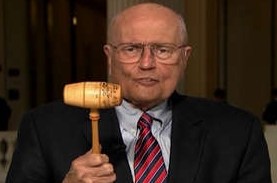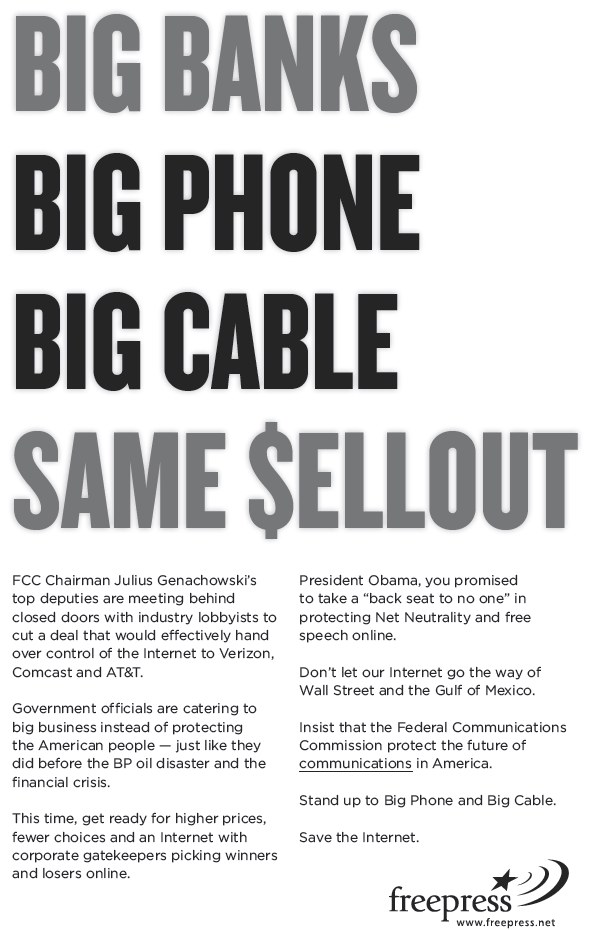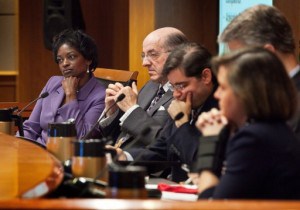Rep. John Dingell has told FCC Chairman Julius Genachowski to drop broadband reform because the Michigan Democrat has not received a detailed reply to his letter about the matter sent back in May. The Hill reports Dingell doesn’t like to be kept waiting for responses to his “Dingell-grams.”
“I find it wholly frustrating that Chairman Genachowski, after nearly two months, still has not responded to my questions about the classification of broadband Internet access services,” Dingell said in his letter.
Dingell added that he has “serious concerns about the FCC’s proposed course of action” and that Congress has “intense interest” in Genachowski’s plans.
In his May letter, Dingell had said he doubts Genachowski’s plan despite his support for network neutrality rules, which the FCC hopes to enact under the authority it would gain through its administrative maneuver.
“I feel Chairman Genachowski’s responses to my questions would be invaluable in informing the debate on the matter,” Dingell wrote this week.
He said the FCC should not proceed with Genachowski’s proposal to boost its power over Internet service providers through a regulatory maneuver known as “reclassification.” In his original letter, Dingell expressed “grave concern” that Genachowski’s plan risks reversal by the courts, putting “at risk significant past and future investments, perhaps to the detriment of the Nation’s economic recovery and continued technological leadership,” he wrote at the time.
Dingell’s days of putting his constituents first are well past. He is the longest currently-serving Congressman and the third longest serving Congressman in the history of the country. These days, having Washington officials bow before him is a much higher priority. In a petulant letter sent to the chairman on July 20th, Dingell puts a deadline, in bold, for Genachowski’s reply.
Genachowski is probably wasting paper and time responding, considering Dingell already made public his opposition for broadband reform back in May when he wrote, “I have strong reservations about the course the commission is presently taking.” Dingell said he’s worried that Genachowski’s proposal would be struck down in court, puts at risk “significant” past and future investments and could even “paralyze” other regulatory initiatives.
The reasons for his opposition amount to little more than concern trolling. The telecommunications industry already challenges virtually every controversial policy enacted by government in the courts, threatens to slash investment in providing broadband service to those they’ve shown little interest in serving before, and do not deserve credit for “technological leadership” as the United States falls further behind others in broadband rankings. The only threat to the national economic recovery from some cable and phone companies is another rate increase eating away at already tight budgets for most Americans.
Dingell’s latest noise opposing broadband reform brought praise from the U.S. Telecom Association, a group run by and for major broadband providers. That should not be a surprise either, considering the USTA is Dingell’s 14th largest campaign contributor, donating $9,000 so far this congressional term.
Telecommunications interests who oppose pro-consumer broadband reform are among Dingell’s biggest contributors (in order of ranking):
| 2 | AT&T Inc | $15,500 |
| 4 | Comcast Corp | $14,000 |
| 14 | US Telecom Assn | $9,000 |
| Source: Open Secrets |
Open Secrets reminds us this is a big money, high stakes fight with special interests pouring tens of millions into an all-out effort to stop meaningful broadband reform:
Since the start of the 2008 election cycle, telephone utility companies have given $12.7 million to federal candidates and party committees and spent $118.7 million on lobbying. Current lawmakers have collected $37.9 million from the industry, with Republicans collecting 51 percent of that.
The computers and Internet industry has spent even more money politicking and has leaned a little more heavily toward Democrats, giving current members of that party 60 percent of their nearly $50 million in total contributions. The industry has also spent $331.4 million on lobbying since 2007.
As the top all-time donor to federal politics, AT&T may have an especially strong standing on Capitol Hill. The company’s employees and political action committee have given $22.6 million since 1989 to current lawmakers through their candidate committees and leadership PACs, with 52 percent of that going to Republicans.
Verizon, too, is considered a “Heavy Hitter” for its extensive contributions over the years to federal political candidates. Current lawmakers have collected $9.2 million from Verizon’s employees and political action committee since 1989, with Democrats receiving 51 percent of that.
[…]
Here are the current lawmakers to bring in the most through their leadership PACs and candidate committees from telephone utility companies since 1989:
| Name | Total |
|---|---|
| Sen. John McCain (R-Ariz) | $1,066,064 |
| Rep. John D Dingell (D-Mich) | $551,909 |
| Rep. Rick Boucher (D-Va) | $538,747 |
| Rep. John Boehner (R-Ohio) | $415,958 |
| Rep. Joe Barton (R-Texas) | $403,420 |
| Sen. John Kerry (D-Mass) | $378,863 |
| Rep. Roy Blunt (R-Mo) | $371,478 |
| Rep. Edward J Markey (D-Mass) | $370,300 |
| Sen. Byron L Dorgan (D-ND) | $329,218 |
| Rep. Steny H Hoyer (D-Md) | $324,090 |
| Sen. Sam Brownback (R-Kan) | $300,914 |
| Rep. Eric Cantor (R-Va) | $299,650 |
| Sen. Mitch McConnell (R-Ky) | $299,386 |
| Rep. Bart Gordon (D-Tenn) | $296,865 |
| Sen. Richard Burr (R-NC) | $293,899 |
| Rep. Fred Upton (R-Mich) | $276,570 |
| Sen. Robert Menendez (D-NJ) | $269,057 |
| Rep. John M Shimkus (R-Ill) | $260,458 |
| Rep. Cliff Stearns (R-Fla) | $237,450 |
| Rep. Ed Whitfield (R-Ky) | $236,990 |
Opposing broadband reform that ultimately helps your constituents in return for campaign contributions and praise from groups like the USTA is business as usual in Washington. Dingell’s outburst shows he’s forgotten exactly who he is supposed to be representing in this debate — his Michigan constituents, facing ever-increasing broadband bills.


 Subscribe
Subscribe







